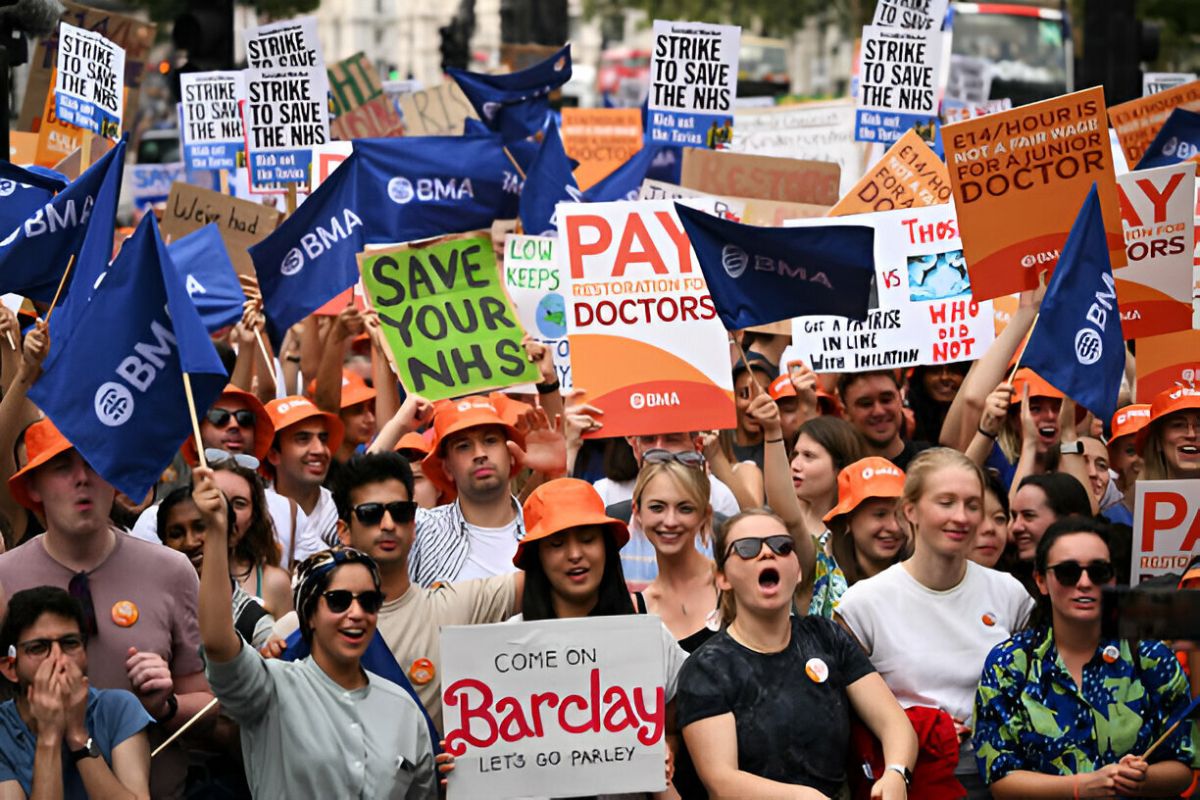The Impending Junior Doctors’ Strike in England: A Comprehensive Overview

England’s National Health Service (NHS) braces for significant disruption as junior doctors announce an imminent strike. This development, coinciding with the general election, raises concerns about potential political motivations and the implications for patient care and NHS operations. This article explores the strike’s specifics, the varied responses from stakeholders, and the broader ramifications for England’s healthcare system and political landscape.
Table of Contents
ToggleContext and Timing of the Strike
The Announcement
Junior doctors, represented by the British Medical Association (BMA), have declared a five-day strike from 7 AM on June 27 to 7 AM on July 2, mere days before the general election on July 4. This timing has sparked debate, with Prime Minister Rishi Sunak suggesting that the strike could be politically motivated, a claim the BMA vehemently denies.
Political Implications
The timing of the strike has led to accusations from Sunak that the BMA’s actions aim to influence the election in favor of the Labour Party. During a campaign event in Devon, Sunak questioned the strike’s timing, noting its coincidence with Labour’s health day and hinting at possible political motivations. This assertion is based on the backdrop of prolonged negotiations and previous strike actions by junior doctors.
Stakeholder Reactions
Government Response
The Prime Minister has criticized the BMA’s decision to strike, emphasizing that the government has already offered a 10% pay increase to junior doctors, a proposal that remains on the table. Sunak has expressed his willingness to continue negotiations, urging the BMA to reconsider its stance to avoid disrupting NHS operations during a critical time.
British Medical Association’s Stance

The BMA refutes claims of political motivation, asserting that the decision to strike was driven by the government’s failure to present a credible pay offer. Dr. Robert Laurenson and Dr. Vivek Trivedi, co-chairs of the BMA’s junior doctors committee, have highlighted the prolonged period of pay erosion experienced by junior doctors, amounting to over a quarter in real terms over the past 15 years. They argue that the strike is a necessary measure to pressure the government into addressing these longstanding issues.
Healthcare Sector Concerns
Healthcare leaders have expressed alarm over the strike, warning that it will exacerbate the already substantial waiting lists and disrupt patient care. Saffron Cordery, deputy chief executive of NHS Providers, described the strike as a “worrying escalation” in the ongoing dispute. Matthew Taylor, chief executive of the NHS Confederation, echoed these concerns, emphasizing the detrimental impact on efforts to improve performance across various NHS services.
Impact on Patients and NHS Operations
Disruption to Services
The planned strike is expected to cause significant disruption to NHS services, with up to 100,000 patients facing cancellations of their appointments, operations, and treatments. This strike follows 41 days of previous strikes since March 2023, which have already resulted in substantial delays and cancellations, further straining the healthcare system.
Financial Implications
The financial cost of strike actions in the NHS is considerable, with an estimated £3 billion spent on addressing the disruptions caused by previous strikes. This financial burden adds to the operational challenges faced by the NHS as it grapples with record waiting lists and the need to maintain service quality.
Broader Implications for the NHS and Political Landscape
Election Dynamics
The strike’s timing has introduced a new dimension to the general election campaign, with healthcare emerging as a pivotal issue. Both the Conservative and Labour parties are leveraging the situation to bolster their respective positions on NHS management and healthcare funding.
Future of NHS Pay Negotiations
The outcome of this strike and the broader dispute over pay and working conditions will likely influence future negotiations between the government and various NHS staff groups. The willingness of the government to engage in meaningful discussions and offer competitive pay packages will be crucial in preventing further industrial action and ensuring the stability of NHS operations.
Conclusion
The upcoming junior doctors’ strike in England underscores the complex interplay between healthcare management, political dynamics, and the well-being of patients. As the strike approaches, it is imperative for all stakeholders to engage in constructive dialogue to address the underlying issues and minimize the impact on the NHS and its patients. The resolution of this dispute will serve as a critical test of the government’s commitment to supporting healthcare workers and maintaining the quality and accessibility of NHS services.
Published by Amanda Mills
Amanda Mills is a seasoned digital marketer and accomplished content writer, known for her dynamic approach to creating engaging and impactful digital content. With over a decade of experience in the industry. View more posts







